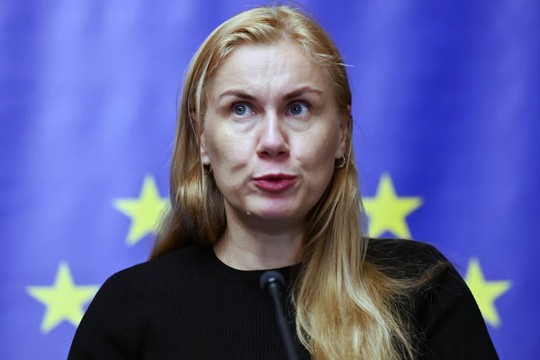EU energy chief Kadri Simson
Photo: AFP
The EU risks higher energy prices this winter after a deal keeping Russian gas flowing to the bloc via Ukraine expires, Brussels officials privately warned countries in an internal document obtained by POLITICO.
Moscow and Kyiv inked a five-year pipeline transit agreement in 2019 that has continued to supply gas to EU countries despite two years of war raging in Ukraine.
Now, with the contract ending on Dec. 31, Ukraine has said it will not seek to renew the pact. EU energy chief Kadri Simson agreed, arguing the EU executive has "no interest" in pushing to revive the agreement.
That means the EU will soon lose about 5 percent of its total gas imports, mostly to central and southeastern Europe, according to the internal document, prepared by the European Commission, the EU's executive. If that loss is paired with a prolonged cold snap, the memo adds, it could create a "worst case" scenario for countries relying on the gas transits through Ukraine.
The prospect is creating anxiety across the region, with Austria, Hungary and Slovakia likely to face the biggest ramifications, according to Aura Sabadus, a senior analyst at the ICIS market intelligence firm.
All could eventually swap Russian imports for supplies coming via Germany, Italy or Turkey, but a recent move by Berlin to unilaterally tax gas exports is complicating that possibility. Sabadus said the tax is reducing incentives for energy firms in central Europe to invest in non-Russian gas supplies.
Brussels has already asked EU countries to phase out imports of Russian fossil fuels by 2027. And the bloc has so far slashed its Russian gas reliance by around two-thirds compared to 2021, turning to places like Norway and the U.S. as Moscow started winnowing supplies.
But now, the EU must prepare for a different type of cutoff.
In its letter, the EU executive says losing Russian supplies through Ukraine may create "higher transport costs" as countries seek alternative routes, while "storage levies" imposed between the bloc’s countries could "make this diversification more difficult and costly."
In a sign of how chaotic and politically sensitive the issue has become, Slovak Prime Minister Robert Fico brought up the transit deal during a high-level visit to Ukraine in late January — before being publicly contradicted by Kyiv.
"An agreement arose that the transit of Russian gas through Ukraine will probably continue, which is great news," Fico said in a statement after the visit.
"The transportation contract ends at the end of this year," Kyiv shot back, adding: "We are not going to negotiate with the Russians and extend the contract, and the Prime Minister of Ukraine informed his Slovak counterpart on this."
But in private, some officials express fears that the planned cutoff could prompt energy shortages.
"We indeed have concerns," said one central European official, who was granted anonymity to speak freely on sensitive matters.
"If the Ukraine transit route was stopped, our security of gas supply might be endangered."
…Does Europe intend to continue living without Russian gas? Good luck!
read more in our Telegram-channel https://t.me/The_International_Affairs

 9:41 04.03.2024 •
9:41 04.03.2024 •























